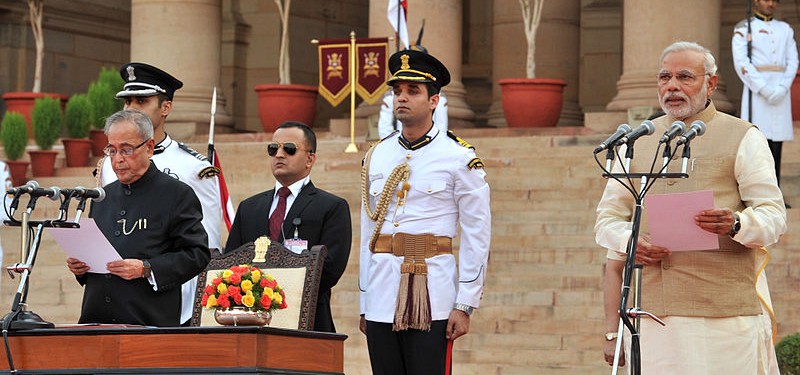Mobility
News and business analysis for Professionals in International Education
Have some pie!
What does Modi’s win mean for international education in India?
 Narendra Modi being sworn in as India's Prime Minister
Narendra Modi being sworn in as India's Prime Minister As the economy improves, outbound mobility is likely to increase. “This is expected to be an outcome of the higher optimism and prospects of economic development, which in turn will encourage more students and families to invest in their education abroad plans,” said Choudaha.
After the value of the rupee began to fall in 2012, education consultant Gandhi agrees that under Modi he is hopeful more students will have more buying power. “The depreciation of the rupee affects the students going overseas because the cost of living automatically goes up, the tuition fee really floats up and it’s difficult to speculate at what end it will stop,” he said.
“If you’re a western professor designing a MOOC you should be thinking about the Indian audience”
It’s not surprising that as he is drafting policy Modi has turned to the only other country in the world that can match India in scale, China. Modi’s priority to expand India’s influence and culture abroad means he’s keen to establish Confucius Institute-like centres at Indian campus to promote Indian culture to visiting students.
“They’re going to make a real effort to reach out to the world so people can learn about India and engage with India,” said Booker at IndoGenius.
Improving the domestic system
In its manifesto, the BJP pledged to increase the public education system conceding that government facilities in sectors including health and education weren’t “up to the mark”.
Additionally, a recent study by the British Council concluded that in order to meet the demand for education brought about by the dramatic socio- and economic developments in the country, the Indian education sector must overcome low enrolment figures, low quality of teaching and learning, constraints on research and inequalities in access to higher education.
According to Deosthale, collaborations that will increase teaching quality are not only the most relevant to India’s educational needs, but also the most easily scalable, especially for providers who are willing to reach out to lesser-known institutions.
“Rather than being one of the 200 or 300 universities that has a relationship with the IIT [Indian Institute of Technology], why don’t you become one of only two universities working with an institution in another part of the country?” he commented.
Modi has put forward the solution of low-cost technology to answer the country’s access problems. Considering the scale and already proven appetite for online education in India, Nick Booker says the government backing creates another huge opportunity for foreign providers.
“India is the elephant in the online classroom,” he said. “You look at the number of Indian consumers of education, like Coursera, Udacity, Khan academy- India is the second largest audience after America. And India is doing that with five times fewer broadband connections than America.”
After being sworn in, all eyes are now on who he will appoint as Minister of Human Resources Development
As internet access across the country improves, we can only expect India’s online education consumption to grow. “If you’re a western professor designing a MOOC you should be thinking about the Indian audience,” advised Booker.
The next 100 days
Modi’s first three months in office will set the course for the next five years. After being sworn in, all eyes are now on who he will appoint as Minister of Human Resources Development (HRD) under which education falls.
“If it’s someone who is forward looking and willing to take up the challenge then yes we can expect change, but if it’s just going to be another politician who’s been given the charge and who has their own ideas, then it’s not going to really help,” said Doesthale.
“Everyone is hoping that it’s one of his closer associates who will have his ear and get things done or is receptive to listening to what universities have to say and is open to change.”
While five years might not seem like enough time to address the mammoth challenges the country faces, stakeholders are optimistic that Modi is the man to deliver results.
According to Booker, “things are going to move very fast, at a Chinese speed but in a democratic environment.”
Still looking? Find by category:



11 Responses to What does Modi’s win mean for international education in India?